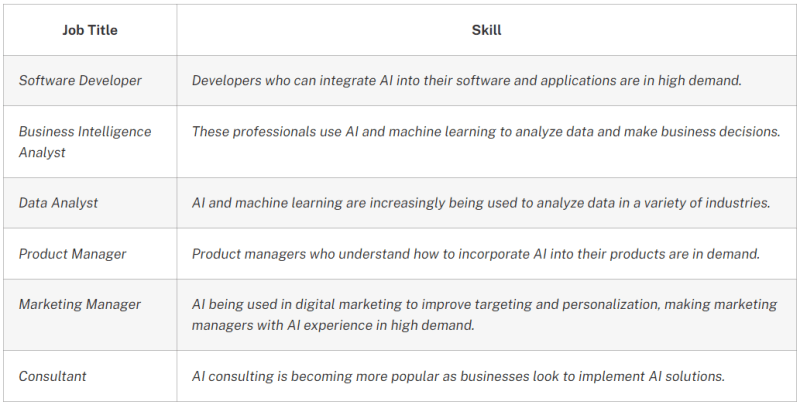AI-Empowered Career Paths: Unlocking the Potential for Upward Mobility in the Software Development Industry
AI is helping developers automate monotonous operations and analyse massive volumes of data. AI engineers, data scientists, and machine learning experts are in demand due to this integration. AI is also changing the skills needed for traditional software development employment.
This blog will explore AI's impact on the software development business, its upward mobility opportunities, and best practices for job seekers and employers to manage this fast changing market.
AI-Volution
New job prospects in software development : The advancement of artificial intelligence (AI) technology is changing the way software is developed, and it's important for individuals and companies to stay informed about the impact it may have on jobs and careers in the software development industry.
AI is already being used in software development to automate repetitive tasks, such as testing and debugging, and to analyze vast amounts of data quickly. This automation is reducing the need for certain job roles, such as manual testers, and is leading to a shift in the types of jobs that are in demand.
Re-skilling and Upskilling Opportunities
Creating new job opportunities and career paths : For example, the demand for AI engineers, data scientists, and machine learning experts is on the rise. A study by Indeed says the percent of searches on Indeed using “AI” or “machine learning” increased by 182%.(Source: Indeed)
DeepMind wrote in a corporate blog post that AlphaCode, an A.I. system from Alphabet subsidiary DeepMind, claims it can compete with some human software developers.
“AlphaCode attained an estimated rank within the top 54% of competitors in programming competitions by tackling novel issues that require a combination of critical thinking, logic, algorithms, coding, and natural language understanding,” (Source: Dice)
Analyzing the Impact of Artificial Intelligence
Preparing for the Future: The Impact of AI on Job Opportunities and Careers in the Software Development industry. However, it's not just the highly specialized AI roles that are in demand, the need for developers who can work with AI is also increasing. The increasing demand for AI skills is leading to re-skilling and upskilling opportunities for software developers.
However, it's not just the developers who need to re-skill and upskill, managers and other professionals in the software development industry also need to understand how AI will impact their roles and the industry as a whole.
Best practices for job seekers and companies to adapt to the AI-driven software development landscape:
While AI is creating new job opportunities, it's also important to acknowledge that it may lead to job displacement. According to a report by the World Economic Forum, 75 million jobs may be displaced by 2022 due to automation and AI, while 133 million new roles may be created. (Source: World Economic Forum)
It's important for software developers to stay informed and proactive in adapting to the changing landscape of software development and AI, and for companies to invest in training and development for their employees.
Navigating the new landscape of software development
Intelligent Coding Assistants:
Intelligent coding assistants are AI-powered tools that help software developers write code faster and more efficiently. These tools use natural language processing and machine learning algorithms to understand the developer's intent and provide suggestions for code completion, error checking, and refactoring.
One of the main benefits of intelligent coding assistants is that they can save developers a significant amount of time and effort.
As these tools become more prevalent, the need for manual coding may decrease, and the demand for developers who can work with these tools and understand how to integrate them into their workflow will increase.
Smart Prototyping:
Smart prototyping is a technique in which AI algorithms are used to generate working prototypes of software applications. This is done by analyzing the developer's inputs and requirements, and then automatically generating code that meets those requirements.
Smart prototyping is particularly useful for quickly creating functional prototypes of software applications, which can then be further developed and refined by developers.
Error Management:
Error management is the process of identifying, diagnosing, and resolving errors in software applications. AI-powered error management tools use natural language processing and machine learning algorithms to understand the context of an error, and then provide suggestions for resolving it.
Error management tools can help developers identify and resolve errors more quickly and efficiently. This not only increases efficiency, but it also frees up developers to focus on more complex and creative tasks.
Conclusion
In summary, the advancement of AI technology is having a significant impact on the software development industry and changing the types of jobs in demand. AI is being used to automate repetitive tasks, and this is leading to a shift in the job market, with an increasing demand for AI engineers, data scientists, and machine learning experts.
It's important for software developers and other professionals in the industry to stay informed and adapt their skills to remain relevant. Additionally, companies need to invest in training and development for their employees.
Some areas in software development being transformed by AI include intelligent coding assistants, smart prototyping, and error management. It's crucial for job seekers and companies to be proactive in adapting to the changing landscape of software development and AI.








Top comments (0)